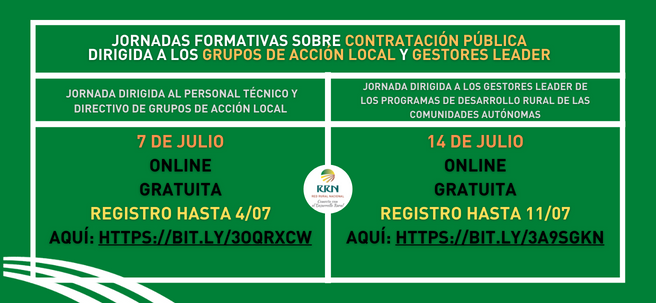
15 de July de 2022
The RRN has organized two training sessions on public procurement, one for the GAL and another for LEADER managers and Managing Authorities of the autonomous communities.
The National Rural Network provides practical training on public procurement to Local Action Groups and LEADER managers.
- The National Rural Network (RRN) has organized two training sessions on the application of the current public procurement law.
- One of them was addressed to Local Action Groups (LAG) and the other to LEADER managers and Management Authorities of the autonomous communities.
LEADER has been an important component of rural development in the European Union since the 1990s. The LEADER approach involves delegating the planning initiative to local communities in each rural area. These communities, organized intoLocal Action Groups (LAGs) , develop and implement a local development strategy for that area, leveraging their resources. These strategies require compliance with thecurrent Law 9/2017 on Public Sector Contracts (LCSP) , as it is part of the LAGs' modus operandi .
For this reason, the RRN has organized two training sessions on public procurement, one for the LAGs and another for LEADER managers and Managing Authorities of the autonomous communities . Why? Because the autonomous communities manage their corresponding Rural Development Programs (RDPs) and select the LAGs through a public call for proposals during each programming period.
More than 200 people attended the first session, while representatives from 15 regional governments attended the second session.
Current public procurement law
The training was led by Carlos Cardosa, one of the authors of the "Public Procurement Guide for Local Action Groups," published by the RRN a few months ago, specifically to assist LAGs and LEADER managers in this endeavor.
Cardosa explained that the current LCSP is aimed at:
- Reduce bureaucracy
- Greater support for SMEs
- And greater budget allocation for social projects
From here on, there has been extensive discussion on two key issues that raise multiple questions:
- Hiring :
- On whether or not the management of LEADER funds by LAGs is subject to contracts subject to harmonized regulation, or is integrated into the public sector contracting platform.
- Regarding the requirement to request three budgets for expenses under €15,000 (services) or €40,000 (works), according to the Subsidies Law, it is not necessary, but GALs are often required to do so, citing cost restraint.
- Questions arise regarding the maximum duration of directly awarded contracts, as it is limited to one year, but there are reasonable doubts that they could be extended to five years.
2. Legal nature of the GAL:
- Local Action Groups—according to the LCSP—are non-profit associations, regardless of their legal form, whose internal organization includes representatives of public and private stakeholders from a given territory and whose objective is the implementation of a local development strategy. This means that most of them are private entities, but they manage public funds.
- In light of this, we call for clarification of the role of GALs as entities subject to public procurement procedures, for which clear instructions from the State are requested.
- At this point, a review of the report prepared by the State Attorney's Office on Local Fisheries Action Groups (FLAGs) is requested, since it is understood that their typology and activities are identical to those of the LAGs.











